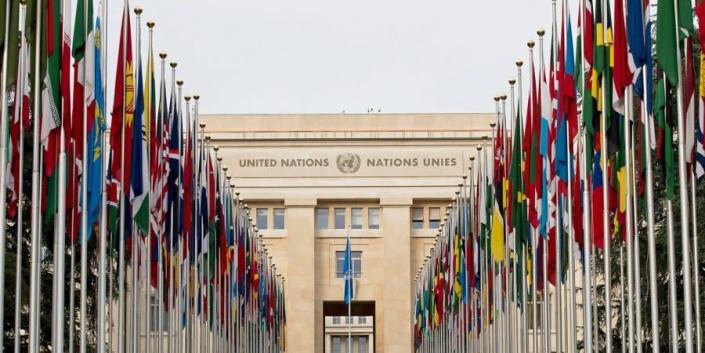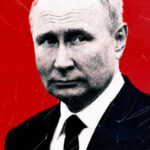
To put an end to this, the participants of the “Kick Russia out of the UN” initiative have set out to prove that Russia illegally appropriated membership of the international organization.
In December 2016, when Russia decided to create a so-called “joint group of troops” in the Russian-occupied Abkhazia region of Georgia, the Ukrainian delegation repeatedly called on the UN Security Council to consider the situation in Georgia and support the sovereignty and territorial integrity of this country within its internationally recognized borders.
Read also: The most comprehensive answer to the question: is Russia a fascist state?
Taking advantage of its status as a permanent member of the UN Security Council, Russia blocked this proposal.
In March 2017, when sham voting took place in occupied Abkhazia and South Ossetia, Ukraine once again initiated discussions at the UN Security Council.
“Russia’s provocative actions are similar to its policy of militarization in the Crimea and its complete disregard for human rights on the Ukrainian peninsula,” Volodymyr Yelchenko, the then Permanent Representative of Ukraine to the United Nations, said at that meeting of the Security Council.
Most of the member states of the Security Council condemned Russia’s aggressive policy and called on Moscow to stop its occupation of Georgian territories, but Russia again blocked the adoption of the statement confirming the sovereignty and territorial integrity of Georgia.
Such decisions, as well as resolutions on the deployment of UN peacekeeping forces, require the consensus of the five permanent members of the Security Council – the United Kingdom, France, the United States, China, and Russia. But there are many examples of the latter (and China) abusing its veto rights, blocking consideration of issues and decision-making aimed at ensuring peace and guaranteeing security in the world. This has been the case with the wars in Georgia, Syria, and Ukraine.
“Due to the presence of such a member of the Security Council as the Russian Federation, this UN body is currently de facto non-working,” says Serhiy Haidai, a political technologist who, together with his communication agency, undertook to ensure public support for the “Kick Russia out of the UN” initiative.
Maksym Baryshnikov, a lawyer and one of the initiative’s founders, goes as far as to describe the very membership of Russia in the Security Council illegal. Also, in his opinion, its termination will contribute not only to the effective work of the Security Council, but also to the earliest possible victory of Ukraine and the establishment of long-term sustainable peace.
Two months ago, the initiative group founded by members of the Public Hub NGO, mainly lawyers, decided to seek consideration of the issue of the illegality of Russia’s presence in the United Nations and, as a result, the deprivation of its powers on the Security Council and other bodies of this organization.
Read also: UN announces team to investigate deadly attack on colony with POWs in occupied Olenivka
The main argument of the “Kick Russia out of the UN” group is not even that Russia is an aggressor country in the organization that is supposed to prevent wars, but that Russia has never gone through the statutory procedure of admission to the United Nations, and so is not a legal member.
How Russia usurped the Soviet Union’s place in the United Nations
In April 1945, representatives of 50 countries gathered in the U.S. city of San Francisco, where for two months they drafted and eventually signed the UN Charter. This document announced the creation of the United Nations, a new international institution that would prevent another World War like the one the world had just experienced. Unlike Russia, Ukraine, at that time the Ukrainian Soviet Socialist Republic (UkrSSR), was one of 50 founding countries that signed the Charter.
The document, which in fact became the constitution of the newly created organization, enshrined its key values: peace, justice, respect, human rights, tolerance, and solidarity. As well as the procedure for accepting new members – through the decision of the General Assembly based on the recommendation of the UN Security Council.
Read also: UN hopes to prolong grain deal, but Russia seeking to limit Ukrainian exports
In addition to the Ukrainian SSR, the founding countries also included the Byelorussian SSR and the Soviet Union itself. So, when the latter ceased to exist in 1991, Ukraine and Belarus became independent states and simply changed their names in the register of UN members. But Russia declared itself not only the heir, as each of the former Soviet republics was recognized, but also the successor of the Soviet Union. And thus took its place in the UN and the Security Council.
“However, the Soviet Union ceased to exist as a legal entity, which Russia also recognized in some documents,” Baryshnikov notes.
“So, if the Soviet Union does not have a continuation, then what could the successor countries be?”
What is also interesting, Baryshnikov continues, is that Russia is not mentioned in Article 23 of the UN Charter, which lists the states that are permanent members of the Security Council – the Soviet Union is still listed there. But why did Russia take its place, and not another former republic of the Soviet Union?
In response to this question, the Russians refer to the Almaty Declaration. In late 1991, the heads of states of the Commonwealth of Independent States (i.e. parts of those countries that were formed on the territory of the Soviet Union) gathered in Almaty, where Russia requested and received their support in its desire to take the place of the Soviet Union in the United Nations. After that, the then Russian President Boris Yeltsin wrote a corresponding letter to the then Secretary of the United Nations, in which he called on the organization to consider Russia as the legal successor of the Soviet Union. Based on this letter, the nameplate “Soviet Union” in the United Nations was replaced by “Russia.”
“Russia simply sat down in the chair of the Soviet Union and changed the nameplate with the tacit consent of other members,” says Haidai.
Read also: Russia preventing access to Ukrainian war prisoners, says UN
But in other, similar situations, the organization has insisted on going through the acceptance procedure, he noted.
For example, when Yugoslavia fell apart, Serbia wanted to take its place in the United Nations, but it was forced to go through the procedure stipulated by the Charter. In the case of Czechoslovakia, both newly formed countries, the Czech Republic and Slovakia, were also accepted through a corresponding vote.
What is more, while studying the documents regarding Russia’s entry into the United Nations in 1991, the members of the initiative group found a conclusion by the organization’s legal advisor, who at that time said it was not possible for Russia to assume membership of the UN without going through the required procedures.
Articles 3, 4 and 110 of the UN Charter establish three stages of such a procedure: an application by a country that is not waging an aggressive war or threatening it, with a request for membership, then a conclusion by the Security Council, and finally the vote of the General Assembly, says Baryshnikov. In addition, the parliament of a candidate state for joining the United Nations must ratify the Charter of the organization and send a letter of ratification to its secretariat.
“Russia hasn’t fulfilled any of these conditions,” the lawyer says.
At the same time, membership in the United Nations is highly valued by Russia. Russians consider it as one of the three main pillars-guarantees of the security of the country’s existence, say Baryshnikov.
He mentions the recent statement of Russia’s former president and deputy head of the Security Council, Dmitry Medvedev, who included Russia’s “thousand-year history,” its status as a nuclear power, and its place in the UN Security Council among such pillars.
“So, our effort to deprive Russia of this place will contribute to increasing Ukraine’s security,” Baryshnikov says.
What’s next
In order to gain public support both in Ukraine and abroad, the initiative group created an international petition titled “Kick Russia out of the UN!” It contains a call to UN Secretary-General António Guterres to provide documentary evidence of the reasons for Russia’s membership in the UN.
“In the absence of such documents, we demand that Russia’s fictitious membership of the United Nations be terminated,” the document reads.
The petition has gathered almost 90,000 signatures in two months. The initiators of the group are aiming to collect one million. Such a number of people supporting the initiative is necessary to draw the attention of the world media to it, explains Haidai. This will help make the problem of the illegitimacy of Russia’s membership of the United Nations a matter of global discussion, and then it will be difficult for politicians of other countries to ignore it, he comments.
In addition to collecting signatures for the petition, the initiative group is also working in other areas, for example, it is preparing a rally at UN headquarters in New York, where a general debate will take place on Sept. 20-26 within the next session of the General Assembly.
On an ongoing basis, the members of the group establish contacts with the ministries of foreign affairs of the UN member states and have already sent their materials and proposals to more than 60 foreign agencies. They are also conducting a dialogue with academic circles in the United States and the United Kingdom to raise the issue of Russia’s membership of the United Nations for discussion among specialists in international law and international relations.
Read also: Ukraine plans to seek at least $300 billion in war reparations from Russia
“We’re trying to knock on every door we see and enter every hall, and they’re opening to us more and more often,” says Baryshnikov.
In addition, the Public Hub is in constant communication with Ukrainian authorities. On Aug. 23, the Permanent Mission of Ukraine to the United Nations officially appealed to the secretariat of the organization with a request to provide documents on the legality of Russia’s UN membership.
This is a big step, since Ukraine has never taken such actions before, Haidai says.
“In addition, as far as we know, with this request, for the first time in the history of the United Nations, the procedure of non-confirmation of the credentials (of a member of the organization) has been initiated due the appeal of an individual country,” Baryshnikov added.
If the United Nations recognizes that Russia’s membership is illegal, the organization’s next step is to strip the powers of the Russian delegation in the Security Council and the General Assembly, the lawyer says.
There have already been such precedents in the history of the organization. For example, the long-term deprivation of the powers of the delegation of the South African Republic due to the policy of apartheid, says Baryshnikov.
Later the United Nations can launch an operation to support peace and security, e.g. with the use of its own air forces on the territory of Ukraine.
“If there were no Russia in the Security Council, the United Nations could have taken measures from closing the skies over Ukraine up to (introducing) a military contingent,” Haidai says.
In addition, the issue of reparations will arise after Ukraine’s victory on the battlefield and the restoration of its state borders, and this issue should be decided by the United Nations, he added. But, if Russia remains in the organization, it will be impossible to make such a decision, he said.
Read the original article on The New Voice of Ukraine




